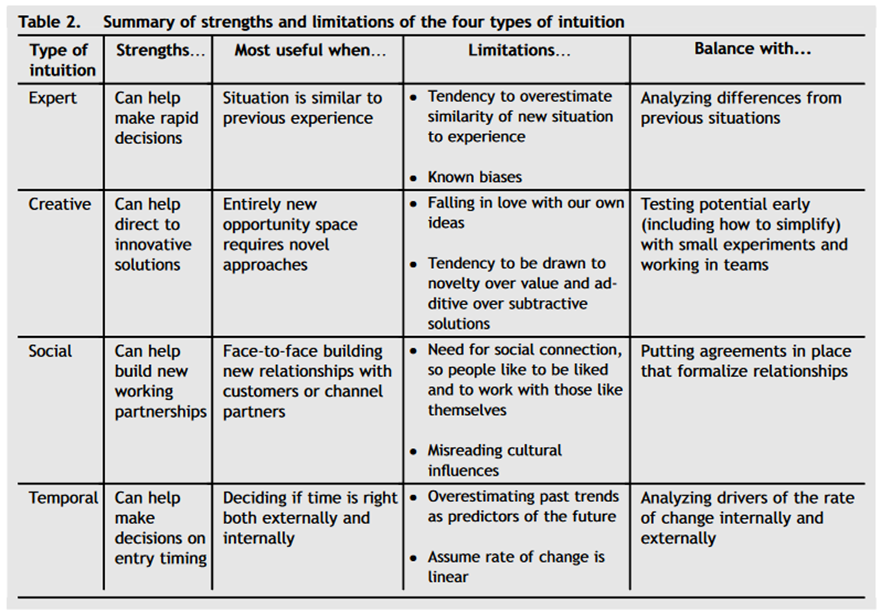4 Types of Intuition Leaders Use for Decision Making
2024.03.15
While the research on intuition comprises a growing body of mainstream scholarly work, inquiry into its use within, and implications for, the managerial and leadership context is currently small.
A qualitative research study (Walsh et al. 2022)1 finds CEOs and founders use four kinds of intuition in their decision making.
Types of Intuition
Though it might be common in everyday parlance to talk about intuition as if it is a singular thing, in psychology it is known to be multifaceted.
Expert Intuition
Expert intuition is the most commonly studied type of intuition in a leadership or managerial context. It is “an involuntary, difficult to articulate, affect laden recognition or judgment based on prior knowledge which is arrived at rapidly, through holistic associations and without deliberate or conscious rational thought.”
It also goes by terms like pattern recognition, automated expertise, problem-solving intuition, intuitive judgement, inferential intuition, and implicit learning – though each of those are nuanced and defined slightly differently.
Creative Intuition
Creative intuition is “a vague anticipatory perception that orients creative work in a promising direction.” It involves holistic synthesis rather than analysis.
It also goes by terms like pattern generalization, entrepreneurial intuition, holistic hunch, intuitive insight, holistic intuition, or coherence and insight. Again, each of those are nuanced defined slightly differently.
Social Intuition
Social intuition is “rapid and automatic evaluation of another person’s cognitive and/or affective state through the perception and non-conscious processing of verbal and/or nonverbal indicators.” It is the intuition we use in interpersonal relationships.
Temporal Intuition
Temporal intuition is a novel, distinct type of intuition identified by the researchers during this study. It is “a slow-to-form, affectively charged evaluation of timing for prospective action and pace of change based on complex patterns of multiple cues.” Basically it is a subconscious feeling of the timing of something.
Temporal decisions include when to start something, what pace it goes at, and the chronology of things. Besides linear types of decisions, there are also cyclical ones.
Study Design
The sample was comprised of 3 CEOs and 4 founders, each with 16+ years of experience. Though the sample size was small (n=7), it was appropriate for this kind of qualitative research.
The researchers guided the leaders to construct cognitive maps at the start of the study. Cognitive maps are “a visual representation of how an individual perceives the range of factors that influence a particular situation, environment, or strategic landscape and the causal relationships between these factors.”
Quarterly, the researchers interviewed the leaders and asked about how they perceived their opportunities at the time. They then analyzed the transcripts to see which types of intuition, if any, were being used.
Qualitative evidence was found for four types of intuition: expert, creative, social, and temporal.
Takeaways for Leaders
4 types of intuition are useful for top-leaders making decisions:
- expert intuition - based on previous experience
- creative intuition - based on a sense of direction for a novel solution
- social intuition - based on a sense of interpersonal relationships, and
- temporal intuition - based on a sense of the timing being right to create or capture an opportunity.
Each type of intuition is best suited to a certain kind of situation and each has limitations. Table 2 from the article gives a helpful at-a-glance summary.

For Coaches
After sharing these four types of intuition with your client, consider asking them to contemplate times they’ve used each one to make decisions.
- Is intuition something they routinely or ever rely on? Why or why not?
- What are some examples of times they’ve used each of the four types?
Tidbits
The authors note that team intuition is an emerging area of research, but they don’t focus on it in this study. They’ve also included moral intuition within social intuition, which is debatable among scholars.
One limitation of the study is that the CEOs and founders were all from the tech sector.
1Research Citation: Walsh, C., J. Collins, and P. Knott (2022). The four types of intuition managers need to know. Business Horizons, 65(5): 697-708, 10.1016/j.bushor.2021.12.003. Ungated version.
Get Posts Sent Straight to Your Inbox
Subscribe to our free emails on leadership, well-being, and healthy connection to purpose.